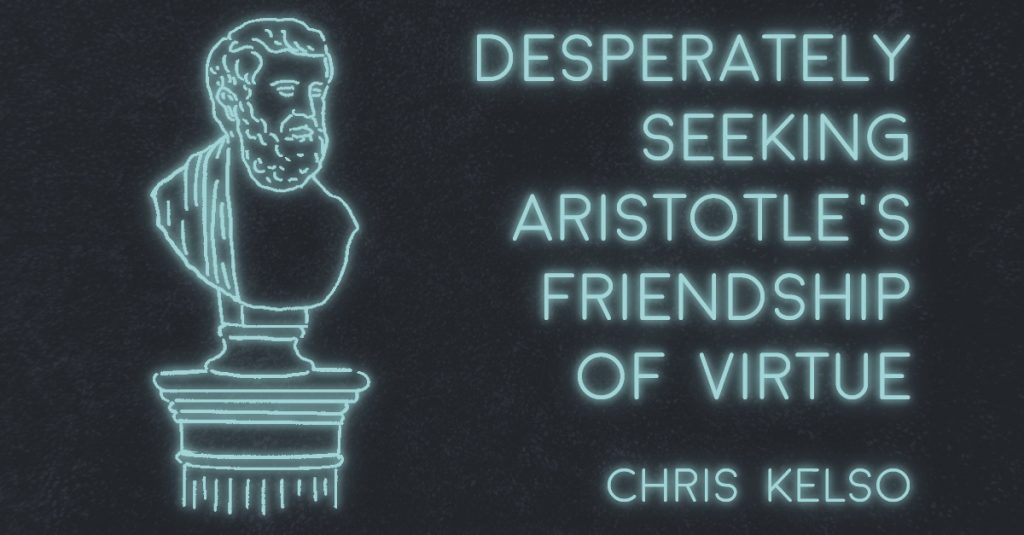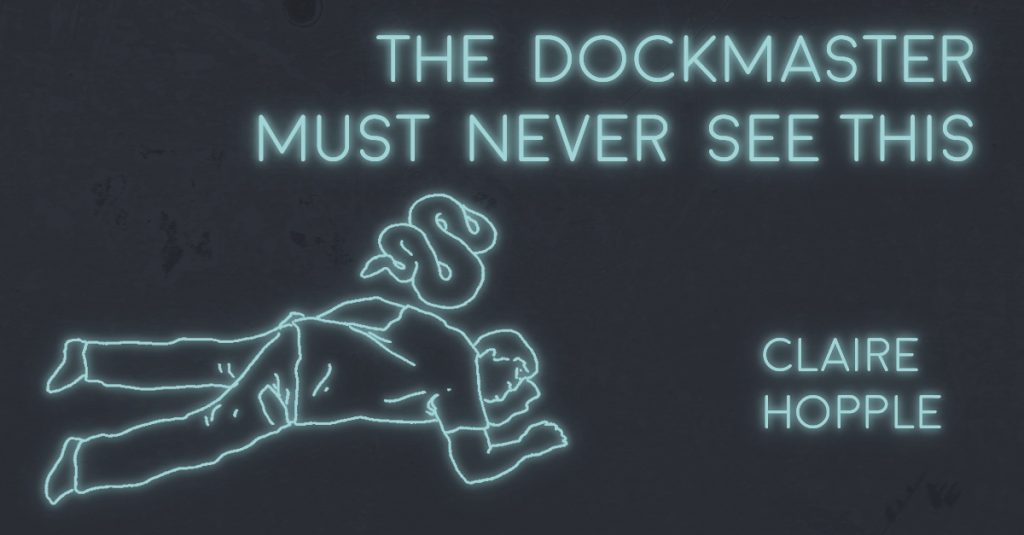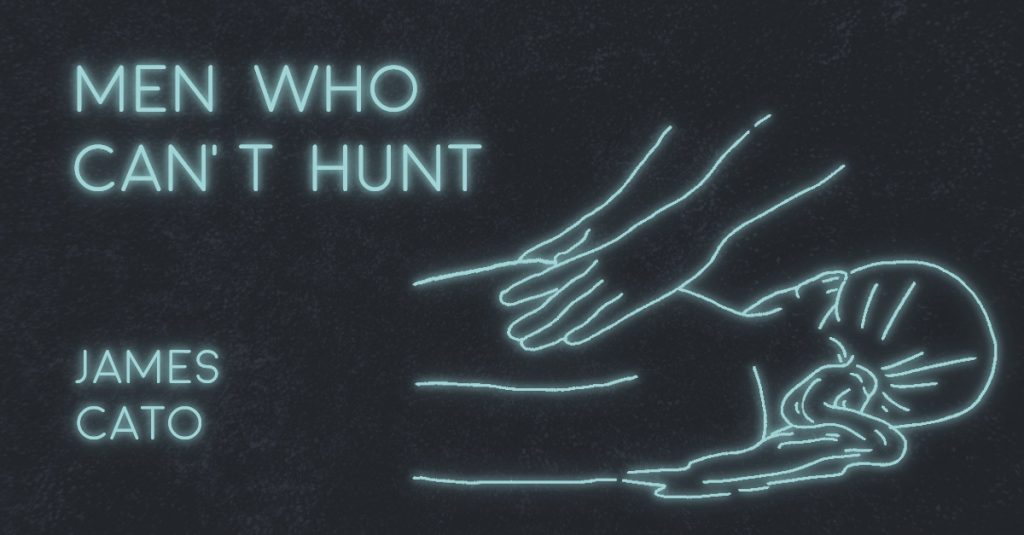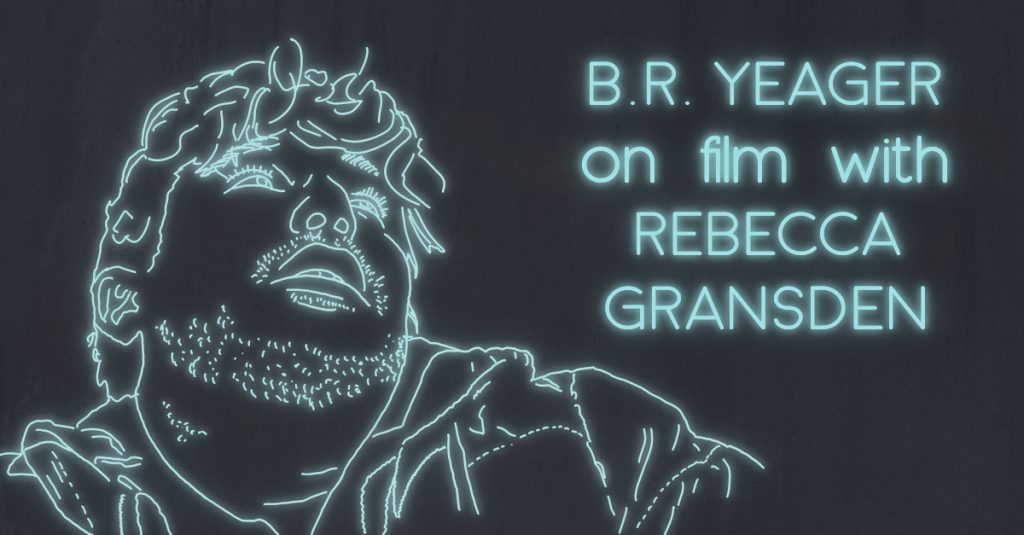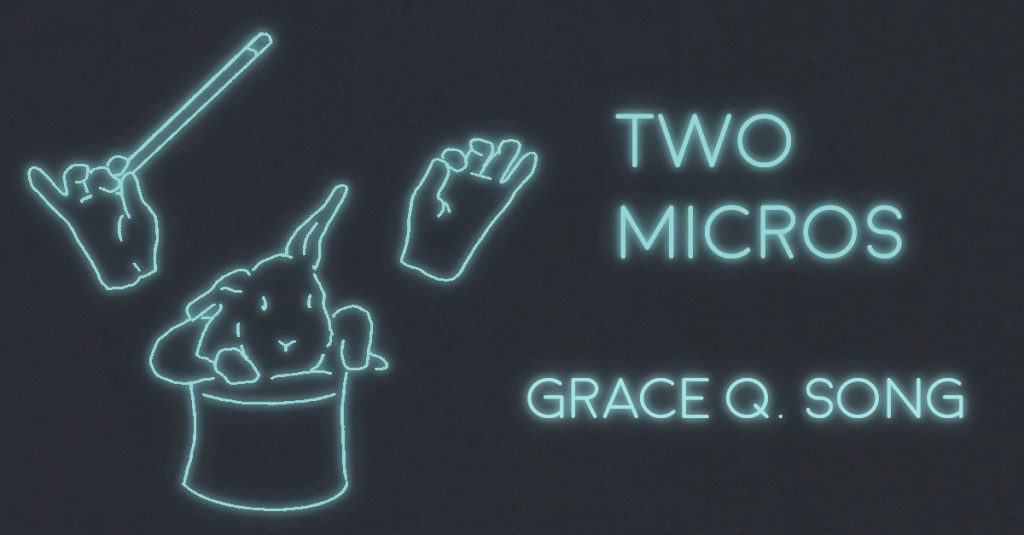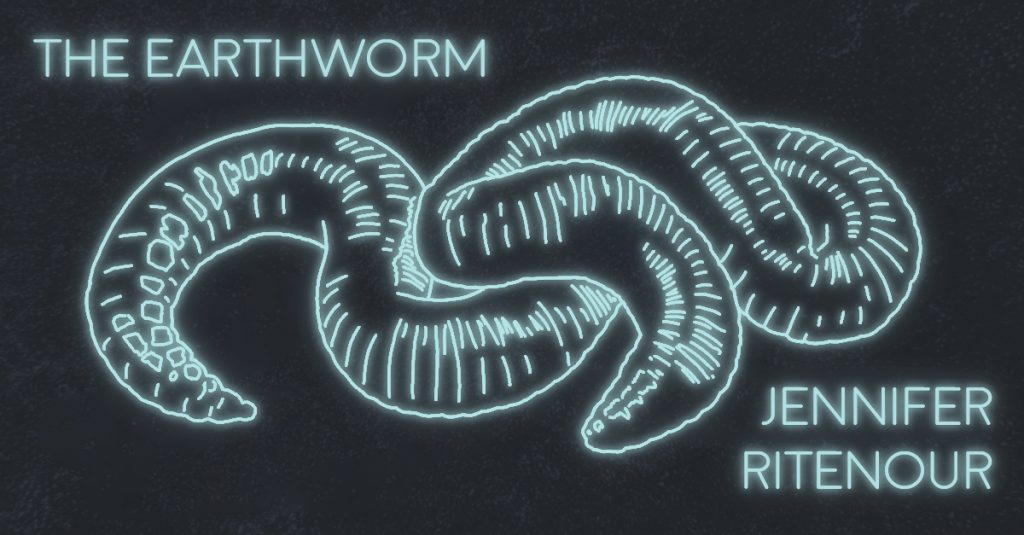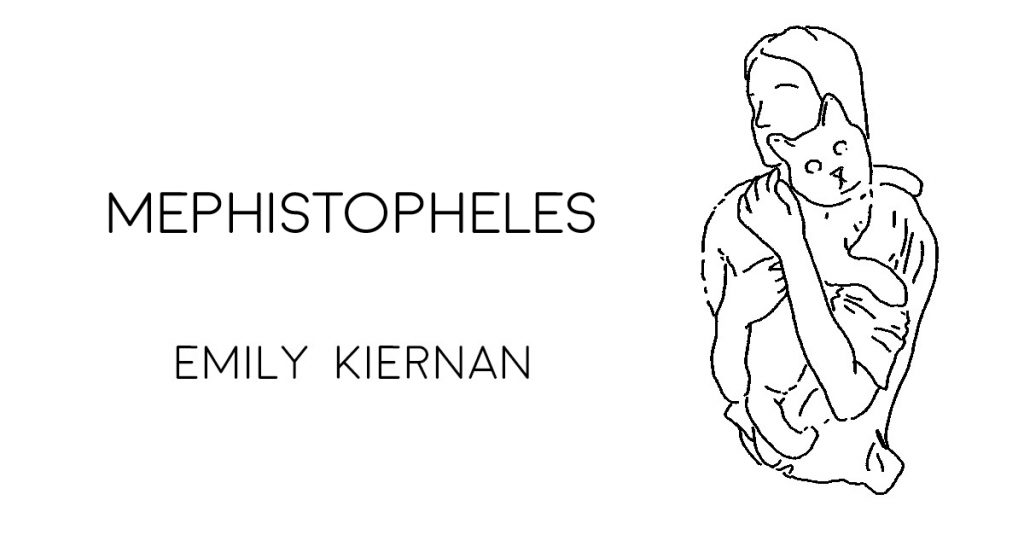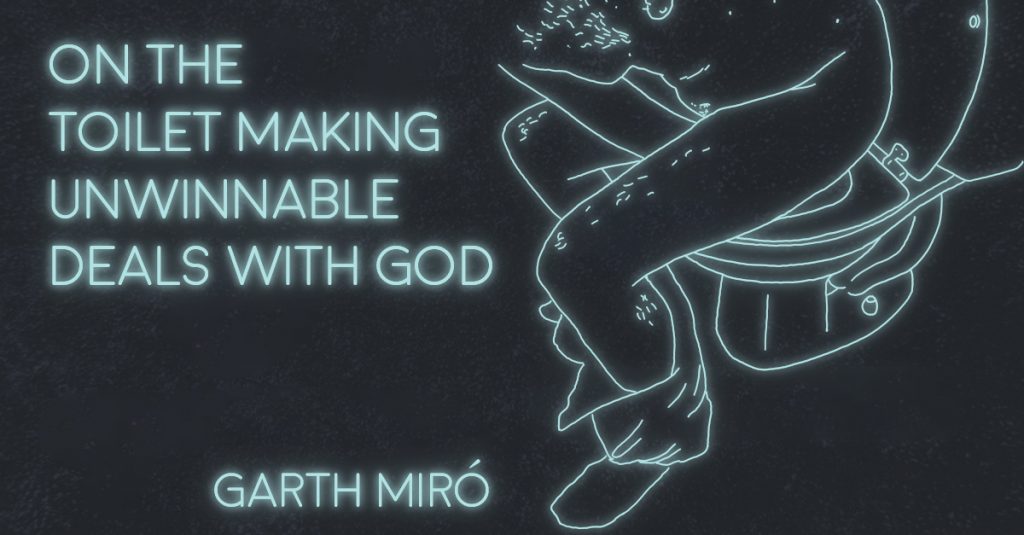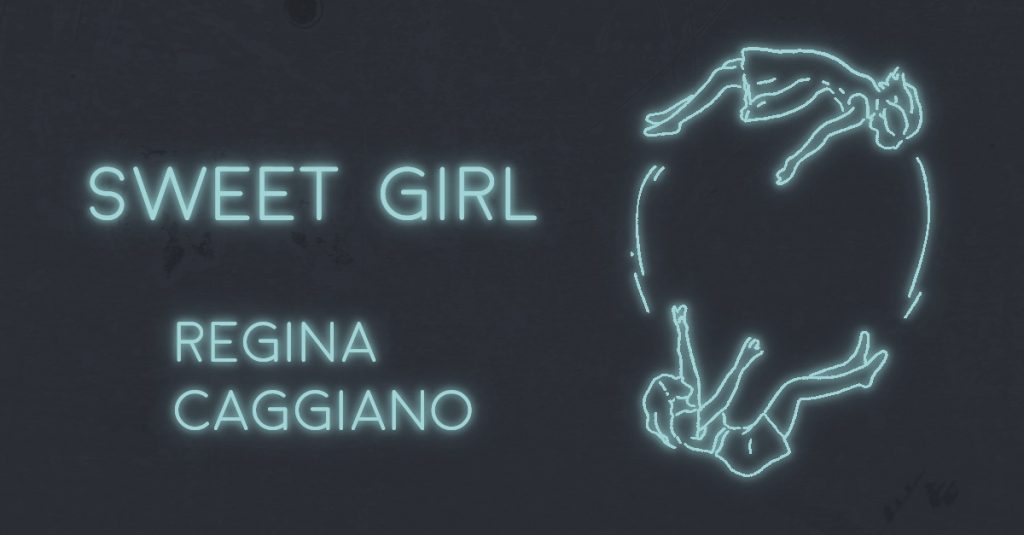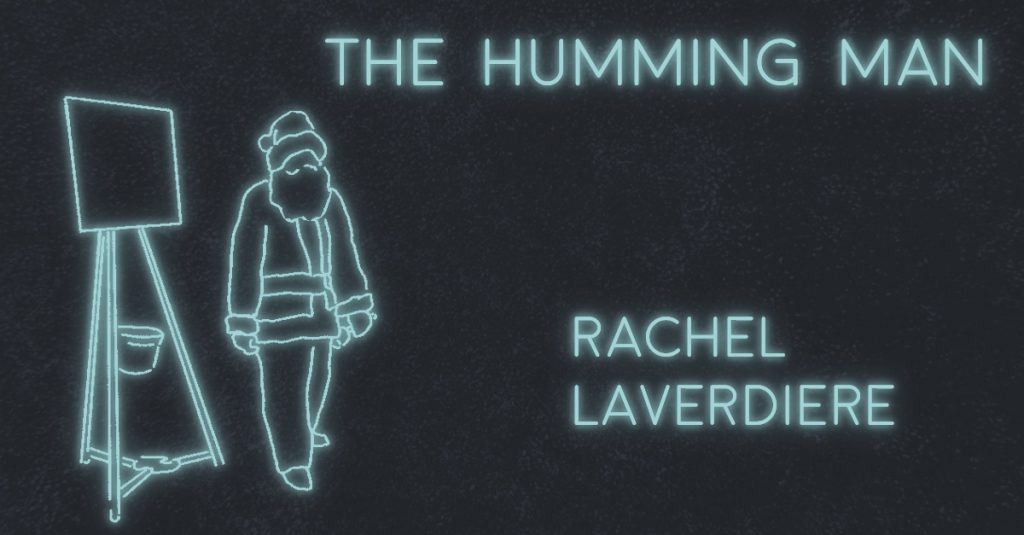Judging by the state of his teeth, the vet estimated he was five years old, but Ella thought he was older than that—a persistent street-cat scrawniness, knots they could never comb out of his long, black fur. She’d had pets before, but he inspired a desperate love in her the others had not, a need to hoist him up in her arms and wrap his skinny body in hers, to protect him. The friend who had found him in the alley behind the Get Go station called him FluffFluff, but Ella had been reading Faust, and she named him Mephistopheles.
She and Alan adopted him when they first moved into the house; they were just married, in a new town far from home. Adopting Mephistopheles was another reflection of the bright sheen of their lives, their seemingly infinite expansion. In theory they were a trio, but Meph was mostly Ella’s. At night he would curl into the curve of her stomach and look at Alan like a party guest overstaying his welcome. Sometimes, when Meph followed her into the bathroom to lace himself between her legs while she peed, Alan would shake his head from the bedroom, saying, “You know that cat’s a pervert, right?”
The first sign that something was wrong appeared in late December. They’d bought Mephistopheles a plastic collar advertising pheromones the internet said would stop him from pissing on the furniture when they went out of town. The day they put it on him, he sat by the locked basement stairs, yowling as they passed, jamming his paws into the gap between door and floorboards. The house was old and creaky and seemed a little haunted—lights that flickered, strange sounds in the walls. They joked the pheromones were ghost pheromones, that Mephistopheles wanted to descend to the world below, to be with his demon family once more. It was funny, mostly, but there was something disconcerting in his glassy eyes, the weird insistence with which he wailed up at them.
“Don’t let him into the basement,” Ella said, panicked at the thought of stacked boxes and open cans of paint stripper. And something else too—she hated the basement; it gave her the feeling of a steady, malevolent gaze.
Alan slipped an arm around her waist. “I won’t,” he said. “It’s creepy as fuck down there.”
Then it was Christmas, and they marinated in eggnog and pine and the clamoring love of nieces and nephews. They didn’t think about Mephistopheles for a week, except when the pet sitter texted Ella photos, and she would pass her phone for Alan to see: Meph’s eyes glowing from underneath the bed, Meph sprawled across Ella’s pillows, Meph pressed against the basement door, staring up at the camera. On Christmas Eve they had dinner with Aunts Miriam and Sylvia, and Sylvia kept pushing the wine on them, opening new bottles and refilling their glasses without asking. Afterwards, Alan’s parents went over to the neighbors’ to meet someone’s new baby, and Ella and Alan didn’t have a condom and decided they didn’t care. She felt woozy the next morning and curled herself into an old armchair as they opened presents, feeling like everyone knew.
Every night after they held whispered conferences in the dark of his childhood bedroom, wondering at themselves—measuring their recklessness and their capacity for its consequences.
“How bad would it be?” she said. “We’ve kept Meph alive.”
She could feel Alan’s gaze—the flat smile that said he was deciding how seriously to take her. They’d had this conversation before: bad genes or climate change or the state of public education in this country. Always they agreed in the end, and always the questions sprouted back like plucked hairs.
“I don’t think it’s the right time,” he said. “Look at this world. You think it’s crying out for new life to be added to the pile?”
She closed her eyes and imagined something bright and bursting within her. “Isn’t it always?” she said.
When they got home—nearly midnight, lugging bags, an open tupperware of cookies in Ella’s hand—Mephistopheles was lying like a ragdoll on the sofa, half-fallen into the crack between the cushions. Ella sat beside him, shaking her hand against his side.
“You sleeping, Meph?” she said, hearing the edge in her voice: he’d been too still. He cracked an eye, extended a paw. Working her hand down into the scruffy mane around his neck, Ella felt the pheromone collar, pocked and scarred from where he’d scratched it with his claws. She undid the strap and handed it to Alan. “I think this worked too well,” she said. “He seems really stoned.”
They went to bed, agreeing that whatever had been in the collar would work its way out of his system overnight. Meph did not follow them up the stairs to their bedroom. They heard him jump down from the couch and take a few steps into the hallway, stopping at the cellar and mewing against the closed door.
The next weeks turned icy, a wintery claustrophobia settling over the house. Before, Meph had liked to sit in Ella’s green armchair while she worked, batting her hands for attention, but now he stayed downstairs all day, interrupting his naps only at Ella’s worried insistence. She and Alan conferred over him in hushed voices, like he was a sick baby they didn’t want to wake. Alan said cats slept seventeen hours a day, but Ella knew that something wasn’t right, though neither, she had to admit, did anything seem precisely wrong. He ate his food and used his litter box. He purred when they pet him. Still, every morning she stumbled out of bed and searched for him, half convinced she would find him stiff.
“Maybe he’s dehydrated,” Alan said. It was past midnight—Ella had woken him with her tossing, stomach cramped with worry. “I think cats are prone to that. Take him to the vet tomorrow, they’ll pump him full of fluids. He’ll be fine.”
The vet was closed the next day, so Ella went to Costco and bought a thirty-two pack of wet cat food. She bought a package of pregnancy tests too, and thought it was a funny thing to buy in bulk—how many could she need? But that night, when she pulled one from its pink packaging and held it below the stream of her pee, no lines appeared. Two lines meant pregnant, one line meant not, and no lines meant, she supposed, that she did not really exist, that she was a specter drifting through her house and her body and her days.
When she googled the brand of the test, she found they’d had a few bad batches—she should throw the whole box away. Instead she pushed it to the back of her underwear drawer and covered it with black tights with runs in their thighs. She thought of Alan whispering to her in bed, “It’s not a good deal. We have great lives, why bargain that away?”
“We’d get something in return,” she’d told him. “We’d love it.” But he’d rolled onto his side and stared out the bedroom window at the cop cars flashing their lights along the street.
“Anything you love you can lose,” he’d said. “Don’t bet your heart on anything alive.”
She mixed the cat food with two tablespoons of water and put it on the floor. When Meph did not get up, she brought it over to where he was pressed into the arm of the couch and held it beneath his nose. He took one bite, another. She sat beside him, wiping up the slurry when he pushed drops onto the upholstery. He ate half the can, then began to spasm and gurgle like he was having a hairball. Ella stroked along his stomach until he was quiet again.
In the morning she took Mephistopheles to the vet, and Alan went to the airport. He would be away for two weeks, attending a string of dubiously important meetings. Ella didn’t want him to go and was surprised by her own neediness. She invented worries about the weather, about planes sliding off ice-slick runways, but he only smiled and kissed her goodbye.
At the veterinarian's office, Mephistopheles jumped down from the table and roamed around the exam room, mewling out his indignation. The vet looked at his teeth and eyes, up his nose, cooing to him as she did. She stuck a cotton swab into his ear, and it came away black with something that looked like spring mud or coffee grounds. “He’s got a little infection,” she said. “Pretty common in Persians.” She took his temperature, and her expression changed. She squinted at Mephistopheles as if he’d admitted to something.
“That’s much too high,” she said, and Ella felt her pulse flutter.
They were sent home with antibiotics and instructions to call back right away if he got worse. Ella lay beside him on the couch, stroking along the spine that seemed harder against her palm than it used to. From somewhere above them came the heavy clatter of footsteps—or, Ella reminded herself, something that sounded like footsteps. Hot water moving through the radiators, the floorboards contracting in dry, winter air. Ella wondered if anyone had ever died in the house. She wondered if there were bodies buried in the basement. Perhaps that’s what she felt down there, those angry, forgotten eyes raking her back as she bent to take laundry from the machine. But the rest of the house felt different, animated by some other force; three times in the first month they’d lived there, she’d dreamed of a woman in the attic, pacing the floor with a baby in her arms. The baby was skinny and sick and wailing, and when the woman turned her face, it was frantic, wisps of hair caught in the corners of her mouth.
Above Ella, the footsteps stopped, started again. She got up and went to the basement stairs to check the lock. Meph followed her, stumbling a few steps sideways. He looked at the closed door, then up at her face.
That night Ella carried Mephistopheles into bed with her, and he allowed himself to be arranged, stretched out in Alan’s spot like a miniature replacement. Her stomach felt unsettled, and when she closed her eyes it was worse, like the bed was a ship at sea. She drifted to sleep only to wake with a start, reaching out to feel the unmoving form beside her, unable to close her eyes until she was sure she felt his breath beneath her hand. Sometime after midnight, she began to hear the footsteps again, coming from the attic or the slope of the roof, quick, tapping strides above her head. The pipes, she told herself, repeating it in the darkness. The pipes, the pipes, the pipes.
Alan called midmorning, and Ella told him about the footsteps in the attic.
“Probably just squirrels,” he said.
“Squirrels,” she repeated, staring down into a bowl of cereal she had poured for herself and no longer wanted. “How would it be squirrels?”
The line crackled. His voice was breathy and thin, like he was shouting to her over a far distance.
“...get out of the cold,” he was saying. “Living in the ceiling.”
She picked up a spoon and swirled it through the flakes in her bowl, extracting a chunk of freeze-dried strawberry and cracking it between her teeth. “It didn’t sound like squirrels,” she said.
By Friday the bedroom smelled of death. It must have been squirrels after all, Ella decided, sniffing the air and imagining the odor like a cartoon hand, beckoning her to its source. A squirrel with a woman’s exhausted footfalls had crawled into the ceiling and died. Mephistopheles hid under the bed most of the day, except when she dragged him out by his back legs to give him his medicine, which he accepted with an eerie calm. She’d taken him back to the vet when he seemed to be growing only stranger and more distant. They’d given her an additional antibiotic and some ear drops and told her to come back if he stopped eating. But he was still eating. He wasn’t standing up more than twice a day, and he wasn’t playing with her shoe laces as she tied them, and he wasn’t purring when she pushed her fingers into his thick fur. But he was eating.
She had thought they might keep him at the veterinary office, observe him or give him an IV or, she didn’t know what—take it out of her hands. She had not realized she’d wanted this until the vet tech had given her a bottle of medicine and started explaining the dosage, and she’d felt her stomach drop. She knew it was an awful thing to wish for. She ought to want him close, to coddle and mother him. But wouldn’t it be better if he was with someone who loved him less? Someone who would see him for what he was rather than getting lost in the anxious pauses between his breaths? Isn’t that the problem with love, and the price of it?
She woke to the sound of footsteps. She sat up in the bed, staring at the ceiling as if to look through it, but seeing only the cracks in the plaster and the ways they seemed to shift in the darkness. The smell was stronger than it had been before—not rotting away but rotting into the structure of the house.
“Hello?” she called out, and thought she heard the slightest pause in the movement, a second’s hesitation before the next foot fell. Beside her, she could see the glow of Mephistopheles’ eyes, watching the same spot as her own.
On the phone with Alan, she felt maudlin, her heart racing for no reason she could name.
“What if I can’t make him better?” she asked. “What if I give up?”
Two a.m. or maybe three. She sat in the green armchair in the attic with Meph sleeping on her lap. Sometime after midnight, he’d begun twitching—weird, spasmodic jerks of his neck, his tongue darting out against his cheek, then back into the dark hole of his mouth. She hadn’t known what to do, and so had picked him up and carried him, shushing and soothing. When he’d finally calmed, they’d been in the attic, and so she’d stayed there, letting him rest. She spoke aloud, not to him. She said, “Did you wish he would die? Did you wish he would hurry up and die already?” The noises seemed to be coming from the roof now, or maybe from somewhere far below.
A lump formed in the skin behind his left ear. At first she only noticed it when she massaged both sides of his head at once, carefully comparing the rigid structures of bone and the soft spaces between. She closed her eyes to make the differences clearer. By the next day, she could see it easily, a red bulge the size of an apricot.
She took another test from the box, and this time it did not tell her she was a ghost. Two pink slashes appeared before she’d even moved the stick to the sink for the three-minute wait. The thing she felt was neither surprise nor its opposite, but something akin to ceremony, the awful sanctity of weddings and funerals and sacrifices of virgins in flowing white gowns. All the ways one might know love and lose oneself to it. Afterwards, Mephistopheles jumped up on the bed beside her and butted his head against her stomach, and for a moment she thought, maybe.
The sound of footsteps again, and Mephistopheles crying. The footsteps louder than they had ever been, an angry rat-a-tat, a struggle or a dance or an endless cycle of anxious pacing—steps and steps and steps leading nowhere. Pipes, she told herself, squirrels, but the words were meaningless, empty sounds. She tried to think of Alan’s voice or the weight of him in the bed beside her, but the memory felt distant and sleep-blurred. The noise Mephistopheles was making sounded strangled now, wan. When she reached out for him, she found that he was wet, a viscous liquid soaked through his fur. She leapt for the light and saw the sheets covered with blood, thick red streaks from his head to his front legs, yellow pus hanging in tendrils from his whiskers. The thing on his neck had opened. He was whining low in his throat, a noise that rose and fell like breath.
She gathered him in her arms, letting the soak spread onto her shirt and sink to the skin of her chest. She was rushing with him—where? Down the stairs in the dim light of the bedroom, half-running, stumbling onto the landing. In the front hall, she set him down by the basement stairs. He went quiet, staring at her with eyes that caught the scraps of streetlight coming through the front window. The house was silent now; her fingernails jittered against the door as she twisted the lock.
Her voice sounded desperate and strained in the quiet. “I did everything I could to care for you.”
She pulled open the door. For a moment he sat there, still and watching her. Then Mephistopheles stood without swaying for the first time in weeks, and walked through the door. From the darkness below, she heard his voice, a small, inquiring note chirping up to her. And after a moment, she stepped through to follow him.
